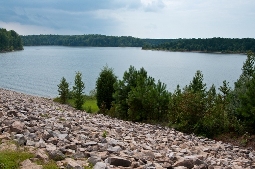A task force set up to look at Raleigh’s water utility gave Raleigh city councilors what seemed like an odd message while creating the budget for the next fiscal year: this is not the time to push any new water conservation measures.
That was just a couple days after the National Weather Service in Raleigh released a statement that started with the sentence, “Drought conditions continue to worsen over much of Central and Eastern North Carolina.” Raleigh is officially in a moderate drought.
Raleigh, like many other cities, faces tough choices when it comes to water. Water is paid by user fees. So when people conserve, the utility, which has its own budget, loses revenue.
Think back to the drought in 2007 and 2008. The city instituted mandatory water conservation measures and then had to raise rates.
So even though Raleigh is now in a moderate drought, the task force set up to look at Raleigh’s water utility says conservation measures will have to wait.
Say What?
Peter Scott, co-chair of the city’s Water Utility Transition Advisory Committee, WUTAT (pronounced WOO-tat) for short, told the Raleigh City Council earlier this month that 90 percent of the water system’s costs are fixed, while three quarters of revenues go up and down with water usage.
Scott, a retired chief financial officer for Progress Energy, explained the system’s financial model this way: “If you have a 10 percent reduction in volume, you would have a 75 percent reduction in revenues, but only a 1 percent reduction in costs. And that really means we have to be very careful about doing things right now that further drive down consumption or else we’re going to have to drive down costs.”
 In other words, if people conserve more water (a good thing in the long term), the city will have to raise water rates (a bad thing during a recession, especially considering this is an election year).
In other words, if people conserve more water (a good thing in the long term), the city will have to raise water rates (a bad thing during a recession, especially considering this is an election year).
Conversely, Scott said, “If you increase consumption, you will have more money to spend” on water infrastructure.
Wait, There’s More
To plan for the future, the city has built a new water treatment plant. That new plant and all the additional infrastructure needs of the system require investment. And investment means bonds.
The city water utility has a good bond rating — the best, actually. But to keep that rating, the Public Utilities Department has to keep water revenue (water bills and fees) steady or growing. Keeping that rating is important; it means to city can borrow money to make new plants or put pipes in the ground at a cheaper rate.
There’s the rub. To keep that bond rating, and keep growing the system and replacing aging pipes, additional water conservation measures would mean a drop in revenue. Or the city council would have to raise water rates. Or it would become more expensive to borrow money for big projects. And the city would have to raise water rates.
Notice a pattern?

Rising Costs, Less Water
No matter how you look at it, the city will have to raise water rates, according to Bill Holman, the other WUTAT co-chair. Holman also served as secretary for the state Department of Environment and Natural Resources 10 years ago and is now at Duke University.
This is the first summer for the new tiered rates program the city initiated for water bills. Tiered rates basically means the more you use, the more it costs. But it only applies to residential water customers.
In the short term, Holman said, the city needs to “go slow and be thoughtful” and watch the impact of water conservation on the utility’s bottom line.
In the long term, Holman said, conservation will be important. As Raleigh grows and expands, the city will “need to find more water,” Holman said, putting “more water” in air quotes. 
“In North Carolina, we get a fair amount of rain, but we don’t store much of it,” Holman said.
Across the state, he said, water is cheap and the systems to get it into homes and businesses are inefficient. Finding “more water” involves conserving and reusing water and storing more of the rain that falls around Raleigh, Holman said.
On top of all these concerns with maintaining bond ratings and the political realities of water rates, WUTAT members also told the city council that there is $7 billion worth of underground pipes that will need to be replaced in the coming decades.
“We think the council needs to understand that we have a huge mountain of costs out there,” Peter Scott said, and water rates will have to go up.
In an interview with the Record this week, Raleigh Public Utilities Director John Carman said, “You could argue that the service we provide the city is underpriced.”
He said the department, which runs water and sewer for the city and surrounding towns connected to the system, plans to increase revenue by 7 percent per year for the next two to three years. That doesn’t necessarily mean raising rates. Instead, it will likely be a combination of rates, fees and new customers.
After those couple years, Carman said, his department would hope to continue increasing revenue by 6 percent per year. But, he said, it’s hard to predict what the financial picture will be more than a couple years down the road.
